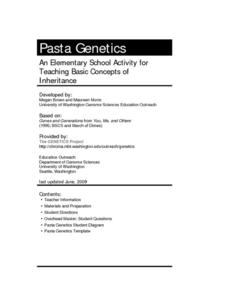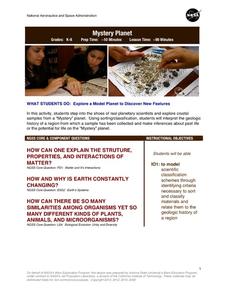Howard Hughes Medical Institute
Got Lactase? The Co-Evolution of Genes and Culture
Does the human body evolve as quickly as human culture? With a stellar 15-minute video, explore the trait of lactose intolerance. Only about 1/3 of human adults seem to still have the enzyme lactase and therefore, the ability to digest...
University of Washington
Pasta Genetics
Four different-shaped and dyed pasta types represent four different alleles. Following a guide sheet, young geneticists practice randomly selecting alleles and discover the traits of the resulting offspring. This is a fun and solid...
Curated OER
Teen Driving: Skills, Responsibilities and Reactions
As an introduction to the skills required for and responsibilities of driving, pre-teens and teens engage in a series of activities, chart their response times, and analyze how variables effect these reaction times. Class groups use the...
SRI International
Nanofiltration
How can everyone in the world have access to clean drinking water? Throughout the lesson plan, learners read about and listen to how water is filtered, what the filtration process removes, and the best ways to filter. They explore the...
Rochester Institute of Technology
Artificial Lung and Diaphragm
She had a terribly busy day converting oxygen into carbon dioxide; now she just needs a moment to breathe. In the activity, scholars review the function of the respiratory system and discuss bioengineering's role in medicine/health and...
Cornell University
Shedding a "Little" Light on Cancer Surgery
Many types of cancer treatments now depend on nanotechnology—a big "little" discovery. Scholars begin by removing "malignant" tissue from simulated brains, one using fluorescent markers thanks to nanotechnology and one without. This...
NOAA
What Little Herc Saw
See the underwater world through a different pair of eyes! Middle school marine biologists identify deep-sea organisms by examining images taken by an ROV from the Okeanos Explorer. After determining what creatures lie beneath the...
Towson University
Mystery Disease
How did scientists determine the cause of illness before technology? Science scholars play the role of medical researcher in an engaging guided inquiry activity. Using observations, technical reading, and Punnett squares, learners...
University of Kentucky
The Great Spider Debate
Poor, misunderstood spiders! They are feared, disrespected, and detested by many people, yet they do so many positive things. A great addition to any insect unit, learn about some of the more common spiders, while hopefully dispelling...
Chicago Botanic Garden
Seasons of a Plant
The third in a series of six lessons is an engaging three-part activity defines that discusses phenology, focusing on the cyclic seasons of plants. Pupils then observe phenology outside before determining how climate change can...
NOAA
What Killed the Seeds?
Can a coral cure cancer? Take seventh and eighth grade science sleuths to the underwater drugstore for an investigation into emerging pharmaceutical research. The fifth installment in a series of six has classmates research the wealth of...
Rochester Institute of Technology
Artificial Eye
Scientists in California developed a bionic eye that allows blind people to see edges of objects in black and white and costs $145,000. In the activity, groups of scholars discuss bioengineering, focusing on the human eye. They then...
NOAA
Deep-Sea Ecosystems – Chemosynthesis for the Classroom
Photosynthesis was discovered in the 1770s, but chemosynthesis wasn't discovered until 1977. While many have performed an experiment to show how photosynthesis works, the activity allows pupils to observe chemosynthesis. Scholars set up...
NOAA
Off Base
How does carbon dioxide affect the world's oceans? The final installment in a series of six lessons has pupils research ocean acidification, then conduct an experiment to witness the delicate balance that exists in our seas. Materials...
Rainforest Alliance
Colombia Biodiversity
How diverse is the rainforest? How much more diverse is a rain forest than a temperate forest? Explore these focus questions in a lesson that explores the plants, animals, and insects in forests. After listening to a reading about...
Science Friday
Capturing Carbon Dioxide
Why don't we just capture carbon dioxide in the air and store it somewhere else? A hands-on activity allows scholars to explore a complex concept. First, they will create a carbonated beverage, and then they will determine if liquid...
Michigan State University
Bug Lyphe!
Introduce ecology classes to biodiversity and interdependence in ecosystems with a PowerPoint presentation. Then, they get up-close and personal with the invertebrate world by collecting insects, classifying them, and graphing their...
Critical Thinking Cooperative
Doing Our Share
Whether at home or in the classroom, each member of a community has certain responsibilities they must tend to. With the help of the children's story Piggybook by Anthony Browne, kids learn how to assign jobs in a fair and safe manner...
Wild BC
Carbon Sinks and Sources
Earth or environmental science pupils are assigned to be carbon sources or sinks. They ask yes-or-no questions to try to figure out which one they are. Then they discuss ways people can have positive effects on the changing climate by...
NASA
Mystery Planet
What can one learn about a planet based on a small surface sample? Learners will explore artifacts from a mystery planet and see what they can determine about the planet based on the evidence in front of them.
Curated OER
The Marvels of Mud
Young scientists roll up their sleeves and get a little dirty in this three-day earth science investigation. Following the scientific method, children monitor the growth of algae in pond water samples in order to determine the role that...
Rainforest Alliance
The Long Road to Coffee
During the fourth lesson of a series on Colombia, pupils discover the process to which the coffee plant becomes the coffee we drink. Pupils compare how locally grown foods get into homes to how coffee from Colombia gets into their mug.
University of California
Hot! Hot! Hot!
Calories are not tiny creatures that sew your clothes tighter every night, but what are they? A science lesson, presented at multiple levels, has learners experiment with heat, heat transfer, and graph the function over time. It also...
Salt River Project
How Do We Clean Polluted Water?
How do we clean up oil spills and other pollutants in the water? Explore water treatment strategies with a set of environmental science experiments. Groups remove oil from water, work with wastewater treatment, and perform a water...
Other popular searches
- Molecular Biology
- Plant Biology
- Biology Lab
- Biology Lesson Plans
- Biology Unit
- Introduction to Biology
- Population Biology
- Biology Crossword
- Biology Calculus
- Biology Vocabulary
- Ap Biology
- Biology Lab Photosynthesis

























